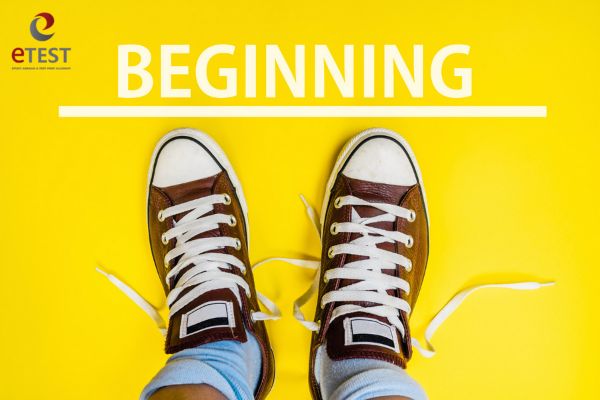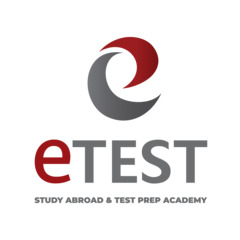Scholarship essay (Personal Statement) is an extremely important factor in the application for a university scholarship in the US as well as other countries with leading education systems such as Canada, Australia, UK... In this article, ETEST English for Study Abroad will send you good essays for studying abroad scholarships and experience in writing scholarship essays to help you achieve the best results.

Collection of good scholarship essays (Personal Statement)
Scholarship Essay (Personal Statement) A personal statement is a short paragraph or essay that you submit with your scholarship application. It is your opportunity to express yourself, to present your thoughts, experiences, and goals in the most profound and sincere way.
Sample Scholarship Essays ETEST English for Study Abroad The suggestions below will help you understand how to structure an effective scholarship essay, from introduction, body to conclusion.
The Book that made Me a Journalist sample scholarship essay
It is 6 am on a hot day in July and I've already showered and eaten breakfast. I know that my classmates are all sleeping in and enjoying their summer break, but I don't envy them; I'm excited to start my day interning with a local newspaper doing investigative journalism. I worked a typical 8-5 day during my summer vacation and despite the early mornings, nothing has made me happier.Although it wasn't clear to me then, looking back on my high school experiences and everything that led to me to this internship, I believe this path began with a particularly savvy teacher and a little book she gave me to read outside of class.
I was taking a composition class, and we were learning how to write persuasive essays. Up until that point, I had had average grades, but I was always a good writer and my teacher immediately recognized this. The first paper I wrote for the class was about my experience going to an Indian reservation located near my uncle's ranch in southwest Colorado. I wrote of the severe poverty experienced by the people on the reservation, and the lack of access to voting booths during the most recent election. After reading this short story, my teacher approached me and asked about my future plans. No one had ever asked me this, and I wasn't sure how to answer. I said I liked writing and I liked thinking about people who are different from myself. She gave me a book and told me that if I had time to read it, she thought it would be something I would enjoy. I was actually quite surprised that a high school teacher was giving me a book titled Lies My Teacher Told Me. It had never occurred to me that teachers would lie to students. The title interestedly me so much that on Friday night I found myself staying up almost all night reading, instead of going out with friends.
In short, the book discusses several instances in which typical American history classes do not tell the whole story. For example, the author addresses the way that American history classes do not usually address about the Vietnam War, even though it happened only a short time ago. This made me realize that we hadn't discussed the Vietnam War in my own history class! The book taught me that, like my story of the Indian reservation, there are always more stories beyond what we see on the surface and what we're teaching in school. I was inspired to continue to tell these stories and to make that my career.
For my next article for the class, I wrote about the practice of my own high school suspending students, sometimes indefinitely, for seemingly minor offenses such as tardiness and smoking. I found that the number of suspensions had increased by 200% at my school in just three years, and also discovered that students who are after only one offense often drop out and some later end up in prison. The article caused quite a stir. The administration of my school dismissed it, but it caught the attention of my local newspaper. A local journalist worked with me to publish an updated and more thoroughly researched version of my article in the local newspaper. The article forced the school board to revisit their “zero tolerance” policy as well as reinstate some indefinitely suspended students. I won no favors with the administration and it was a difficult time for me, but it was also thrilling to see how one article can have such a direct effect on people's lives. It reaffirmed my commitment to a career in journalism.
This is why I'm applying for this scholarship. Your organization has been providing young aspiring journalists with funds to further their skills and work to uncover the untold stories in our communities that need to be reported. I share your organization's vision of working towards a more just and equitable world by uncovering stories of abuse of power. I have already demonstrated this commitment through my writing in high school and I look forward to pursuing a BA in this field at the University of Michigan Ann Arbor. With your help, I will hone my natural instincts and inherent writing skills. I will become a better and more persuasive writer and I will learn the ethics of professional journalism.
I sincerely appreciate the committee's time in evaluating my application and giving me the opportunity to tell my story. I look forward to hearing from you soon.

Planners and Searchers Scholarship Sample Essay
Being African, I recognize Africa's need for home-grown talent in the form of “planners” (assistants with possible solutions) and “searchers” (those with desperate need) working towards international development. I represent both. Coming from Zimbabwe my greatest challenge is in helping to improve the livelihoods of developing nations through sustainable development and good governance principles. The need for policy-makers capable of employing cross-jurisdictional, and cross-disciplinary strategies to solve complex challenges cannot be under-emphasized; hence my application to this scholarship program.
After graduating from Africa University with an Honors degree in Sociology and Psychology, I am now seeking scholarship support to study in the United States at the Master's level. My interest in democracy, elections, constitutionalism and development stems from my lasting interest in public policy issues. active, my current research interests in democracy and ethnic diversity require a deeper understanding of legal processes of constitutionalism and governance. As a Master's student in the US, I intend to write articles on these subjects from the perspective of someone born, raised, and educated in Africa. I will bring a unique and much-needed perspective to my graduate program in the United States, and I will take the technical and theoretical knowledge from my graduate program back with me to Africa to further my career goals as a practitioner of good governance and community development.
To augment my theoretical understanding of governance and democratic practices, I worked with the Zimbabwe Election Support Network (ZESN) as a Programs Assistant in the Monitoring and Observation department. This not only enhanced my project management skills, but also developed my skills in research and producing communication materials. ZESN is Zimbabwe's biggest election observation organization, and I had the responsibility of monitoring the political environment and producing monthly publications on human rights issues and electoral processes. These publications were disseminated to various civil society organizations, donors and other stakeholders. Now I intend to develop my career in order to enhance Africa's capacity to advocate, write and vote for representative constitutions.
I also participated in a fellowship program at Africa University, where I gained greater insight into social development by teaching courses on entrepreneurship, free market economics, and development in needy communities. I worked with women in rural areas of Zimbabwe to setup income-generating projects such as the jatropha soap-making project. Managing such a project gave me great insight into how many simple initiatives can transform lives.
Your organization has a history of awarding scholarships to promising young students from the developing world in order to bring knowledge, skills and leadership abilities to their home communities. I have already done some of this work but I want to continue, and with your assistance, I can. The multidisciplinary focus of the development programs I am applying to in the US will provide me with the necessary skills to creatively address the economic and social development challenges and develop sound public policies for Third World countries. I thank you for your time and consideration for this prestigious award.
Saving the Manatees Sample Scholarship Essay
It is a cliché to say that I've always known what I want to do with my life, but in my case it happens to be true. When I first visited Sea World as a young child, I fell in love with marine animals in general. specifically, I felt drawn to manatees. I was compelled by their placid and friendly nature. I knew then and there that I wanted to dedicate my life to protecting these beautiful creatures.
Since that day in Orlando, I have spent much of my spare time learning everything there is to know about manatees. As a junior high and high school student, I attempted to read scholarly articles on manatees from scientific journals. I anger my friends and family with scientific facts about manatees– such as that they are close relatives of elephants–at the dinner table. I watched documentaries, and even mapped their migration pattern on a wall map my sister gave me for my birthday.
When I was chosen from hundreds of applicants to take part in a summer internship with Sea World, I fell even more in love with these gentle giants. I also learned a very important and valuable lesson: prior to this internship, I had imagined becoming a marine biologist, working directly with the animals in their care both in captivity and in the wild. However, during the internship, I discovered that this is not where my strengths lie. Unfortunately, I am not a strong student in science or math, which are required skills to become a marine biologist. Although this was a disheartening realization, I found that I possess other strengths that can still be of great value to manatees and other endangered marine mammals: my skills as a public relations manager and communicator. During the internship, I helped write new lessons and presentations for elementary school groups visiting the park and developed a series of fun activities for children to help them learn more about manatees as well as conservation of endangered species in general. I also worked directly with the park's conservation and communication director, and helped develop a new local outreach program designed to educate Floridians on how to avoid hitting a manatee when boating. My supervisor recommended me to the Save the Manatee Foundation so in addition to my full-time internship at Sea World, I interned with the Save the Manatee Foundation part-time. It was there that I witnessed the manatee rescue and conservation effort first hand, and worked directly with the marine biologists in developing fund-raising and awareness-raising campaigns. I found that the foundation's social media presence was lacking, and, using skills I learned from Sea World, I helped them raise over $5,000 through a Twitter challenge, which we linked to the various social media outlets of the World Wildlife Federation.
While I know that your organization typically awards scholarships to students planning to major in disciplines directly related to conservation such as environmental studies or zoology, I feel that the public relations side of conservation is just as important as the actual work done on the ground. Whether it is reducing one's carbon footprint, or saving the manatees, these are efforts that, in order to be successful, must involve the larger public. In fact, the relative success of the environmental movement today is largely due to a massive global public relations campaign that turned environmentalism from something scientific and obscure into something that is both fashionable and accessible to just about anyone. However, that success is being challenged more than ever before–especially here in the US, where an equally strong anti-environmental public relations campaign has been taken hold. Therefore, conservationists need to start getting more creative.
I want to be a part of this renewed effort and use my natural abilities as a communicator to push back against the rather formidable forces behind the anti-environmentalist movement. I sincerely hope you will consider supporting this non-traditional avenue towards global sustainability and conservation. I have already been accepted to one of the most prestigious communications undergraduate programs in the country and I plan to minor in environmental studies. In addition, I maintain a relationship with my former supervisors at Save the Manatee and Sea World, who will be invaluable resources for finding employment upon graduation. I thank the committee for thinking outside the box in considering my application.
How to write a great scholarship essay
Step 1: Identify the audience and requirements of the essay
While defining the essay’s criteria is essential, it is equally important to research and analyze your audience. The school’s admissions committee is your target audience. Good scholarship essays clearly state the requirements of the school, expressing their own personality while still remaining relevant to the topic.

Step 2: Explore yourself through real-life experiences
Personal lessons are valuable and profound. They can come from experiences in extracurricular activities, interactions with motivated individuals, listening to special stories or getting them when you work on projects, etc. You find out your strengths and limitations through experiences. From there, choose a life philosophy and development direction to improve yourself every day.
As you grow, you will inevitably face challenges and risks. Now is the time to face them and overcome them. Show your ability to think critically and solve problems on your own.
Step 3: Outline ideas, choose topics and keywords for your scholarship essay
Once you have completed steps 1 and 2, you have laid the foundation for the scholarship essay that you want to present to the committee. After carefully examining the above mentioned factors, brainstorm ideas, choose a topic, and make a list of keywords that are most suitable for your English scholarship essay.
Remember that colleges are looking for candidates with potential for outstanding scholarships, so those phrases should match the requirements of the English scholarship essay prompt.

Step 4: Develop ideas and build scholarship essay content
Once you have ideas and keywords for your scholarship essay, you start structuring your essay by outlining 5 to 10 ideas that you think you can use in your essay and identifying the connections between them.
It doesn't have to be complicated, you can freewrite – point out your ideas and draw diagrams, put them in order or you can do something else, as long as you feel it is useful for your scholarship application essay.

Step 5: Create a strong statement that emphasizes your personality
A statement – also known as a slogan – is essential when writing an English scholarship essay. The slogan provides a summary of the essay’s content, and reveals your attitude and personality. The stronger and more compelling your personality is, the more profound and unique your statement will be. This is an essential ingredient for your own success.
Step 6: Complete your English scholarship essay
- You can start writing your scholarship essay based on the steps above. Identify a central theme from the ideas you have, then explain, support, and justify that theme.
- Start composing your introduction and conclusion once you have a solid grasp of your topic. Writing your essay in this order makes it more logical, understandable, and interesting than writing it the usual way.
- Make sure the topics are presented in a logical and logical order; this will determine the success or failure of your scholarship essay.

Step 7: Listen to feedback and comments after writing your English scholarship essay
Send your scholarship essay to knowledgeable people you trust, such as your parents, mentors, or siblings, to get their feedback. You will be able to identify problems that you cannot see, such as problems with presentation, logic of ideas, etc., by asking for feedback and getting adjustments.

Step 8: Screen, edit and finalize your scholarship essay
After receiving feedback and reviewing the sample scholarship essay, you need to carefully proofread and correct all the details, including spelling, grammar, style, and meaning. The key to future success lies in your diligence now.
Experience in writing scholarship essays to get high scores
Start writing your scholarship essay early.
Writing an essay for a scholarship to study abroad takes a lot of time and effort, so you should prepare as early as possible to avoid leaving it until the last minute. Prepare yourself for the experience early and spend a lot of time editing your essay.
The beginning of 11th grade is the best time to prepare this scholarship essay. Whatever problem you are facing, once you have identified the problem, you can solve it.

Distinguish and apply main essay and secondary essay
You need to distinguish between PS and SOP to get English essay for scholarship success. PS, short for “Personal statement”. PS often takes the form of powerful, deeply personal anecdotes that demonstrate its importance, fearlessness, and maturity in this way.
When using a PS in an essay, the goal of the idea might include discussing your interests, worldview, and opinions beyond the essay topic. That way, you can highlight your unique personality and leave a lasting impression on the admissions committee. A single personal statement can be used interchangeably for all schools.
In addition to the personal statement, some TOP universities also require a supplementary essay if you want to apply. The supplementary essay is usually shorter (from 250 words) with diverse topics for students to be creative but no less difficult.

Don't lead into an essay with a childhood story.
From the past to the present, there are many people who use childhood stories to cite in their essays. Those stories make you look unprofessional, immature and not trustworthy enough. That wrong start makes the committee feel bored and uninterested in your scholarship essay.
Many of you have used childhood stories in your essays as an introduction. Because of these stories, you become less professional, less capable and trustworthy in their eyes. The committee will feel bored with scholarship essays with such motifs.

Use positive language to apply for scholarships
The success of your scholarship essay is also significantly influenced by your choice of language. You mention your past problem-solving methods to solve problems in a positive, constructive way in both your essay and your presentation. Naturally, the admissions committee will give higher marks to scholarship essays with more positive language.

Short scholarship essay style
The secret to writing an English scholarship essay is to keep it short and not rambling. This helps the essay to be logical and connected.
Do not rewrite information already in your CV.
You should focus on the main point rather than listing all your extracurricular activities or achievements. Use the space in your essay to highlight experiences that are not listed on your resume. If the content is repeated from your CV, it will become noisy, making it difficult to understand the main points.

Avoid overusing highly technical words
Scholarship essays do not need to be filled with technical jargon. Overusing academic vocabulary and colloquial language will detract from your professionalism and score points. The admissions committee is looking for your personality and goals, not your knowledge.
The above article has provided you with good sample scholarship essays, writing as well as experience writing scholarship essays just for you. If you are planning to study abroad in the US and especially apply for a scholarship to study abroad but don't know where to start, let ETEST English for Study Abroad help you design your own unique path through the course AMP(Admission Mentoring Program) – writing scholarship essays.
ETEST ENGLISH FOR STUDY ABROAD
Contact information:
- Hotline: 0933 80 66 99 (District 3) | 0937 80 66 99 (District 7) | 0936 17 76 99 (Da Nang)
- ETEST District 3: 3rd Floor, 215 Nam Ky Khoi Nghia, Anh Dang Building, Vo Thi Sau Ward, District 3, HCMC
- ETEST District 7: 6th Floor, 79 - 81 - 83 Hoang Van Thai, Saigon Bank Building, Tan Phu Ward, District 7, HCMC
- ETEST Da Nang: No. 9, Road C2, Da Phuoc International Urban Area, Thanh Binh Ward, Hai Chau District, Da Nang City
Explore now: Impressive achievements of ETEST students




